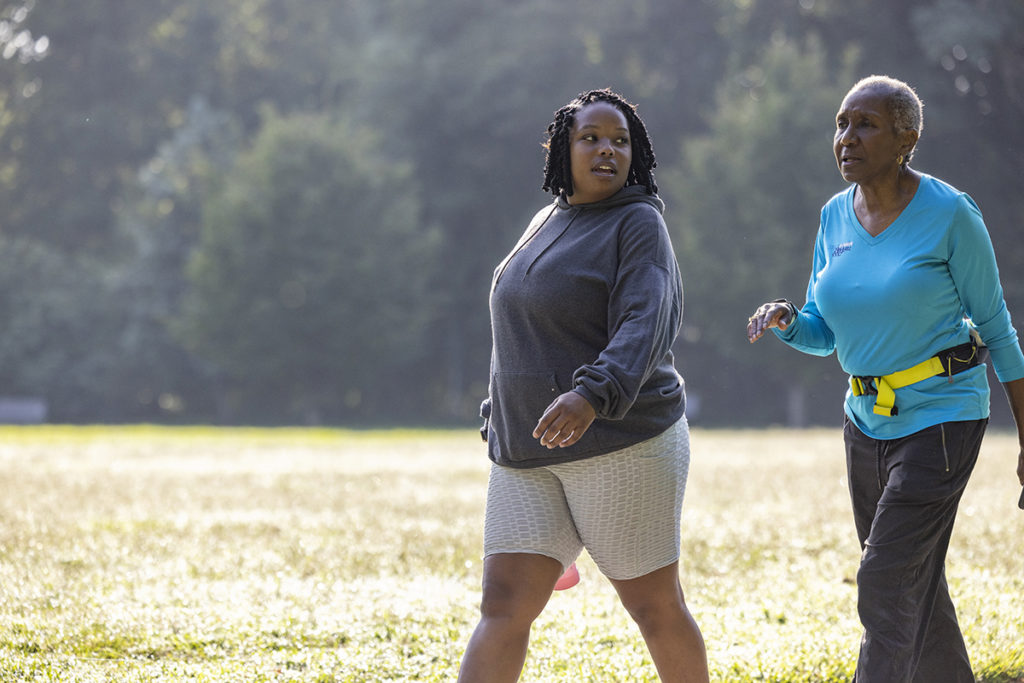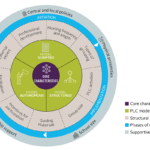By Rebecca Ledsky (FHI 360), Cynthia Baur (UMD), Thomas Lehman (FHI 360), Lisa Tensuan (FHI 360)
Our Innovation
Based on the theory of planned behavior, previous experience with LCPs, and formative research with lifestyle coaches and eligible participants, the team identified the idea of a partner approach, where people who are at risk for developing type 2 diabetes or have a diagnosis of prediabetes join with a family member or friend. Partners joined the LCP with the commitment to work together to meet the weight loss and physical activity goals; both partners pledged to be active LCP participants.
The National DPP LCP already provides social support through the lifestyle coaches and other cohort participants. We thought that this partner approach would super charge the social support available to those who joined the program. Participants would feel immediately comfortable and be able to benefit from the program from day one.
The partner approach is not simply adding in one more person for social support. It is about bringing a partner approach to everyday actions that we know many people generally do with others such as grocery shopping, sharing a meal, and taking a walk.
The project team created support tools for lifestyle coaches and participants to foster ongoing communication about topics that partners might not have much experience talking about. The participant activities showed partners how to help each other daily and build a commitment to shared eating and physical activity goals that last beyond the program’s end.
Methods
Prior to implementation, site personnel, including lifestyle coaches and any other program administrators, were trained by the study team to use and report on the family approach LCP. Informed consent was obtained for primary data collection for evaluation activities.
Surveys and qualitative approaches were used to explore reactions to classes with partners and materials used. We used three sources of data for this evaluation:
- Administrative/outcome data from the family approach LCP
- Lifestyle coach feedback (qualitative)
- Participant feedback (qualitative and quantitative)
Administrative/outcome data collection was collected by the LCP program administrative staff and/or the lifestyle coach. These process data came from the standard record keeping that each of the programs performed. The numbers of people who were enrolled and then retained over the course of the 12-month program were among the data elements provided by the LCPs. Additionally, aggregated weight loss and percentage of people who met National DPP LCP physical activity outcomes were made available.
Lifestyle coach feedback was collected through 60-minute individual interviews at 3, 6, 9, and 12 months. Response rate for data collection was 100%. Interviews with lifestyle coaches were conducted by members of the study team using an online videoconferencing platform.
Participant surveys were administered online at 3 and 9 months. Survey responses were linked over time. Seventy-eight percent of participants completed the 3-month survey while 85% of participants who were still in the program completed the 9-month survey.
Participant focus groups were 60 minutes and conducted online using an online videoconferencing platform. All focus groups were moderated by a member of the study team.
Thematic analysis was conducted for qualitative data using NVivo. Descriptive statistics for quantitative data were generated using SPSS.
Findings
Partner approach participants tended to be both proud of what they had accomplished and cognizant of what they need to do to stay healthy. They were motivated to maintain the changes they made. In addition to continuing to work with their partner, several spoke of looking for bridge programs to work more on their lifestyle changes. Participants also wanted to continue to live by the healthy eating and physical activity guidance they received from the National DPP LCP.
One of the problems that the partner approach was designed to address was attrition. In their article, Retention Among Participants in the National Diabetes Prevention Program Lifestyle Change Program, 2012–2017, Cannon et al. reported their analyses showed that, on average, 32% of participants were retained through the 44th week of this 52-week program. The 52-week retention rate for participants in our partner approach LCPs who had a diagnosis of prediabetes or were at risk for type 2 diabetes was 79%, with three sites having 52-week retention rates above 80 percent.
Results were equally as strong for behavior changes. Participants were generally successful, meeting both the desired weight loss and physical activity outcomes by the end of the LCPs. Four of six sites had at least 50% of participants at risk for type 2 diabetes lose at least 5% of their body weight. Additionally, four of six sites had at least 60% of at-risk participants averaging 150 minutes of physical activity per week. These are the outcomes signifying success in National DPP LCPs.
Conclusions and Implications
The team has developed a toolkit with resources to help delivery organizations adopt the partner approach and is promoting it to National DPP funders, administrators, LCPs organizations, and lifestyle coaches. Our team has already leveraged the insights from this partner approach demonstration project to launch a federally funded Black family program for diabetes prevention and management. The team has completed the first year of planning and will support the African American Health Program in Montgomery County, Maryland to implement a family-centric lifestyle change program with up to 80 Black families. Family members will join as partners committed to meeting healthy eating, physical activity, weight loss, A1C, and other goals. It appears to the study team that more work recruiting partners and conducting partner-only National DPP lifestyle change programs using the materials developed for this purpose is warranted.
This partner approach may be a way to attract and enroll people at risk who are more comfortable joining an LCP with a partner, as well as those who might not join if they did not have a family member or friend willing to “partner up.” Long-term, the partner approach may provide a pathway for the National DPP to have the population effects it was intended to have, the reduction of the incidence rates of type 2 diabetes. We believe that the partner approach can accelerate participation in and the success of this solid but underused program, changing the course of diabetes in the United States.

See Research in Action
FHI 360 US PROGRAMS



